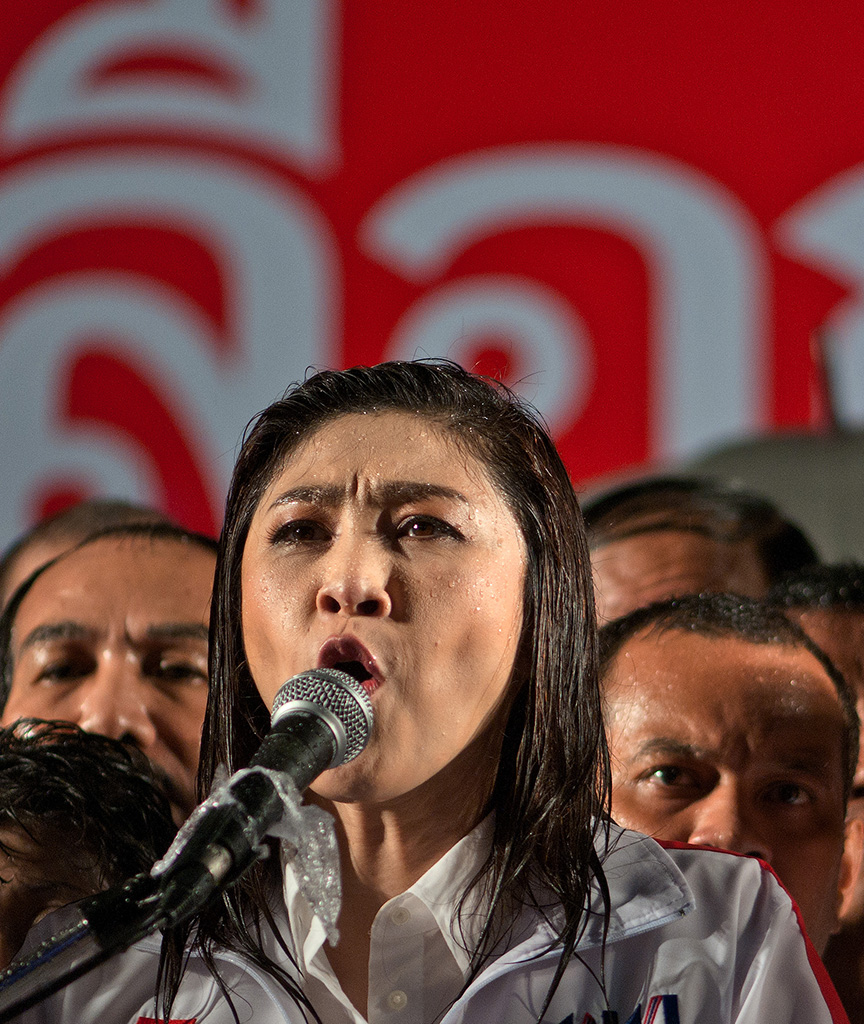The Isaan Record’s continued report on reactions from the Northeast to the impeachment of former Prime Minister Yingluck Shinawatra.
KHON KAEN – In the Northeast the impeachment of former Prime Minister Yingluck Shinawatra continues to raise questions over the legitimacy of the process and quashes the hopes of many for a return to democratic rule.
The National Legislative Assembly (NLA) recently impeached Ms. Yingluck over allegations of corruption in her government’s rice subsidy scheme and imposed a five-year-ban from politics. Ms. Yingluck also faces criminal charges of dereliction of duty put forward by the Office of the Attorney-General based on an investigation by the National Anti-Corruption Commission (NACC).

Yingluck Shinawatra in 2011 at a Pheu Thai Party campaign rally at Rajamangala Stadium in Bangkok. Photo credit: flickr: ratchaprasong2
Ms. Yingluck will likely stand trial in the Supreme Court Criminal Division for Holders of Political Positions, just as her brother Thaksin Shinawatra in 2008, who fled the court’s ruling into self-imposed exile.
“This case will be hard to fight because the court will base its legal proceeding on the already completed investigation of the NACC, which found her involved with the alleged corruption,” explains former Khon Kaen senator Wan Suwannaphong in an interview.“In this kind of case, if Ms. Yingluck is ruled guilty, there can be no appeal.”
In Pheu Thai Party’s rice subsidy scheme, the government bought rice from local farmers at up to twice the market rate and stockpiled it with hopes of hiking up global prices before selling it for a profit. At the time, Thailand was the world’s largest exporter of rice, but other countries increased their exports, causing the price of rice on the world market to plunge. That left Thailand with a financial loss of about US$15 billion and an estimated 18 million tons of rice stored away in warehouses.
In some cases rice was supposedly smuggled from neighboring countries and sold to the government at the subsidized rate.
Many, however, believe there was nothing criminal about the policy. Dr. Wiboon Shamsheun, a former Pheu Thai vice minister from Kalasin points out that the policy was expected to cause financial loss. Every government faces the challenge of finding ways to stimulate economic growth. The Yingluck administration used the rice subsidy scheme as a wealth distribution mechanism to support farmers and inject money into the economy.
“Obviously, people like populist policies because they receive benefits through them. And if people like it, what’s the damage? What’s the point of being a government that isn’t popular with the people?” asks Dr. Wiboon.
Dr. Wiboon also questions the legality of Ms. Yingluck’s removal from power. He argues that the former prime minister’s impeachment has no legal grounds since the interim constitution of 2014 neither includes a mechanism for impeachment nor specifies proceedings for such a case.
“This country is governed through a parliamentary system in which there is no impeachment motion as this is a characteristic of presidential systems. It’s like putting the wrong lid on the wrong pot”, explains Dr. Wiboon. “So it is unclear what governance or legal principles [the NLA] is referring to.”
Wasan Chuchai, secretary and committee member of the Khon Kaen provincial branch of the Lawyers Council of Thailand, disagrees and argues that it is the right of NLA members to impeach any holders of political positions according to the law. However, he concedes that the NLA’s decision was not a legal decision proving wrongdoing on the part of Ms. Yingluck, which can only be determined by the courts.
“The impeachment of Ms. Yingluck is about keeping her off the political stage and preventing her from taking any political office again. This is a mechanism that is necessary in our system,” says Mr. Wasan.
Tul Prasertsilpa, president of the Citizen’s Anti-Corruption Network Khon Kaen, stresses the legitimacy of the impeachment motion as based on the constitution. His group is closely aligned with Suthep Thauksuban’s anti-government protests that instigated the downfall of the Yingluck government a year ago.
“The impeachment forces Ms. Yingluck to finally show responsibility to the parliament and the people for her government’s political wrongdoing,” Mr. Tul says.
After the impeachment, the military government, citing martial law, forbade Ms. Yingluck from holding a press conference. On her personal Facebook page, though, a note was posted stating that democracy had died along with the rule of law.
Mr. Wasan says that this statement, “Doesn’t respect the legal system in our country. Ms. Yingluck never acknowledged her faults and she doesn’t want to take any responsibility for her mistakes. Now she is defending herself and blames her own failures on the system.”
However, Ms. Yingluck’s statement rings true for many, reflecting the prevailing gloominess about the prospects of democracy and true reconciliation in the country.
“In many instances, we thought that democracy in Thailand was dying, but then we still had a flicker of hope in us. Now, after the impeachment of Ms. Yingluck, we see that democracy is in fact dead,” says Sutin Klangsaeng, a member of the Pheu Thai party-list from Maha Sarakham. He added that his party has lost all of its confidence in the military government’s reconciliation process.
This sense of resignation is echoed by Mr. Wan, who has little hope for a return to democratic rule under the current circumstances. “You cannot plant the seeds of democracy anywhere in Thailand at the moment. It’s like a volcano just exploded and all the land is covered in lava—democracy cannot grow because of the heat.”
In the last two weeks, the impeachment has garnered national and international criticism. At home, the military junta has launched a new round of summoning key Pheu Thai and red shirt leaders who have spoken out against the NLA’s decision. But quieting international critiques has proven more difficult.
On a visit to Thailand last week, senior US envoy, Daniel Russel, described the disposal of Ms. Yingluck and the criminal charges against her, as potentially “politically driven.” He called for an end to martial law and expressed concerns about the restraints on freedoms since the military seized power.
In contrast, Mr. Tul argues that martial law and restrictions on freedom of expression are still necessary to ensure social peace in the country, even if the international community may see it as a sign of “underdevelopment” of Thailand’s democracy.
“Freedom comes with responsibility and it means that everyone can exercise their rights,” Mr. Tul reasons. “But if people use their rights to incite division among each other and to violate the law, this is not freedom.”
The military government reacted to Mr. Russel’s comments by summoning the most senior American diplomat stationed in Bangkok and expressing its displeasure. Deputy Foreign Minister Don Pramudwinai said that the US lacks an understanding of Thai politics.
However, for Dr. Wiboon, the main problem lies elsewhere. “Now they claim that the US doesn’t understand Thailand,” he says. “But it’s rather that Thailand doesn’t understand democracy.”





